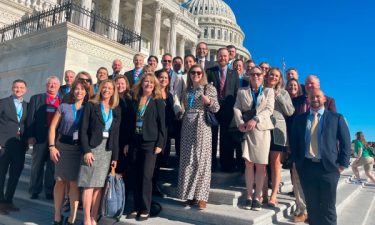By Jim Hedrick, GSI WA State Lobbyist and Spokane Regional Advocate

As the 2024 session draws to a close, both chambers spent Monday in fiscal committees in advance of the deadline for bills with financial impacts to be voted on in a fiscal committee in the opposite house. One of the most watched bills that did not advance was the rent cap legislation, HB 2114 (Alvarado, D-Seattle). The Senate Ways & Means committee ultimately did not take up the bill for a vote given it did not have the backing of enough Democrats to pass, notably lacking the support of Senators Mark Mullet (D-Issaquah) and Kevin Van De Wege (D-Port Angeles). Neither of these moderate Senators will be returning to the Senate next session and thus, a new version of the bill in 2025 may enjoy an easier path if more progressive Democrats are elected in 2024. Both the House and Senate spent the majority of the rest of this week in caucus and on the floor scrambling to pass as many of their priority bills as possible before the clock ran out on Friday, March 1.
On Wednesday, the House passed SB 6009 by Senator Jasmine Trudeau, (D-Tacoma), banning the use of hog-tying by law enforcement. This issue has gained national attention after the death of Manuel Ellis, a 33-year-old African-American man from Tacoma who died in police custody after spending the final moments of his life hog-tied. While the Department of Justice has recommended eliminating the practice since 1995, the Attorney General’s Office’s use-of-force model policy advises against it, and the Criminal Justice Training Commission no longer trains officers to use this method of restraint; it is used in three jurisdictions in Washington. The bill passed 89-7 and was amended by the House so must return to the Senate next week.
The House passed SB 5427 (Sen. Javier Valdez D-Seattle) on Wednesday, requiring the Attorney General’s Office to oversee a hotline to assist people who have been targeted or affected by hate crimes and bias incidents. The hotline will accept reports of hate crimes and bias incidents and provide appropriate crisis intervention and victim-centered, culturally competent, and trauma-informed information. These services will be accessible to as many Washington state residents as possible, irrespective of the language they speak. Under this bill, the AGO would also be mandated to develop a standardized process to collect, analyze, and regularly report information related to these incidents to the Governor, Senate, and House of Representatives. The collected data would be required to be made publicly available after redacting personally identifiable information for the protection and safety of the victims. Rep. Sharon Tomiko Santos (D-Seattle) spoke about the incident in her district where the Wing Luke Museum was damaged with anti-Asian vandalism. Republicans opposed the bill, suggesting they preferred use of social sanctions. The bill, unamended, passed 56-39.
On cut-off days, the 5:00pm bill in each chamber is the source of great speculation. Both the House and Senate chose highly controversial bills this time. The Senate took up a piece of legislation they had started work on the day prior, HB 1589 (Rep. Beth Doglio, D-Olympia), the bill that accelerates the transition from natural gas to electricity. After a fiery debate, the bill passed 27-22 with Senators Mullet (D-5) and Van De Wege (D-24) joining Republicans in opposition. Across the rotunda, the House took up SB 5241 (Randall, D-26), the “Keep Our Care Act” that would regulate future healthcare mergers with the intent of preserving access to reproductive, gender-affirming, emergency, charity, and end-of-life care. Shortly before 5:00pm, the House announced SB 5241 would come up next, they went to caucus, and did not return to the floor. SB 5241 will not advance this session.
Another significant piece of legislation that did not advance on cut-off day was labor’s number one priority, HB 1893 (Rep. Beth Doglio, D-Olympia). HB 1893 would have provided unemployment benefits to striking workers. Supporters had said the bill would level the playing field for workers, while detractors claimed the policy would upend the balance between business and labor at the bargaining table. Only three states, New Jersey, New York, and Maine, have allowed striking workers to access jobless benefits.
In addition to the flurry of floor activity, joint committees met this week to address the three initiatives to the legislature majority Democrats have chosen to hear.
On Tuesday, a joint session of the House Finance and Senate Ways & Means Committees heard public testimony on Initiative 2111. This measure would prohibit the state, counties, cities, and other local jurisdictions from imposing or collecting income taxes, defined as having the same meaning as “gross income” in the Internal Revenue Code. Of the 6,674 people signed in not wishing to testify, the majority were signed in in support of the initiative. 213 people signed up to testify, but when called upon by the vice chair, were by and large not online and did not testify. Of those who did, progressive activists denounced the initiative, suggesting simultaneously that it is a solution in search of a problem and also that it is unhelpful in their hopes to change the tax code. Conservative activists suggested it would be unfair to have both a sales tax and an income tax. The bill was voted out of committee on Friday.
Wednesday morning, Initiative 2081 was heard in a joint session of the House Education and Senate Early Learning & K-12 Committees This measure would allow parents and guardians of public-school children to review instructional materials and inspect student records, including health and disciplinary records, upon request. It would require public schools to provide parents and guardians with certain notifications, including about medical services given and when students are taken off campus; access to calendars and certain policies; and written notice and opportunities to opt students out of comprehensive sexual-health education and answering certain surveys or assignments. While absentee testifiers plagued this hearing as they did the 2111 hearing, 6,647 people signed in not wishing to testify. Testimony for this hearing was somewhat better coordinated than the hearing the day prior, with most testifiers either signed in as “Other” or “Pro.” Supporters of the initiative spoke to years of legislative overreach and erosion of parental rights. Those testifying as “Other” suggested that much of what is included in the initiative is already part of state and federal law, but that additional clean-up language may be needed from the legislature in the future due to ambiguities in the writing of the initiative. The bill was voted out of committee on Friday.
Also on Wednesday, the Senate Law & Justice and House Community Safety, Justice & Reentry Committees heard public testimony on Initiative 2113. This measure would remove certain restrictions on when peace officers may engage in vehicular pursuits. Such pursuits would be allowed when the officer has a reasonable suspicion a person has violated the law, pursuit is necessary to identify or apprehend the person, the person poses a threat to the safety of others, those safety risks are greater than those of the pursuit, and a supervisor authorizes the pursuit. 169 people signed in to testify and 5,484 people signed in not wishing to testify. Like the other initiatives, the vast majority of those signed in supported the initiative, signaling a major organizing effort from the Let’s Go Washington team. Brian Heywood, the funder of the six initiatives spoke in support, citing increases in fleeing suspects. Few others were able to speak within the one-hour time allowed for the hearing as legislators used most of the time asking questions of staff. The bill was voted out of committee on Friday.
Representative JT Wilcox (R-Roy) announced this week that he will not seek re-election after having served 14 years in the legislature. Wilcox served as Minority Leader of the House Republican Caucus from 2018-2023, when he stepped down and was replaced by Rep. Drew Stokesbary (R-Auburn). In his announcement, Wilcox decried “single party thinking,” but added “As long as we have Democrats like Larry Springer, Frank Chopp and Mike Chapman, we will have people who can be partners in the coming re-emergence of a government that works.”
From here, if a bill has been amended by the second house, the first house must decide whether it will concur in the amendments or not. If the first house concurs in the amendments, the bill has passed the Legislature. If the first house disagrees with the second house, it can ask the second house to recede from the amendments. If the second house recedes, the bill has passed the Legislature. If the two houses cannot resolve their differences, one of them can ask for a conference committee. In this situation, members from each house meet behind closed doors to discuss the differences. If they agree on what is to be done, the conference committee makes a report. Both houses must adopt the conference committee report for the bill to pass the Legislature. If one house does not adopt the conference committee report (whether by vote or inaction), the bill has not passed.
The last day of the 2024 regular Legislative Session is Thursday, March 7.
For More Information
Public Policy developments change fast. Note this is a wrap-up of the week of February 26-March 1. You can find the prior week wrap-up here: February 19-24, February 12-16, February 5-9, January 9-February 3, January 22-26, January 15-19, and January 8-12, 2024. For more details about any of the bills in this article, visit the Washington State Legislature page to search by bill number. For more information contact Jake Mayson, Director of Public Policy.





